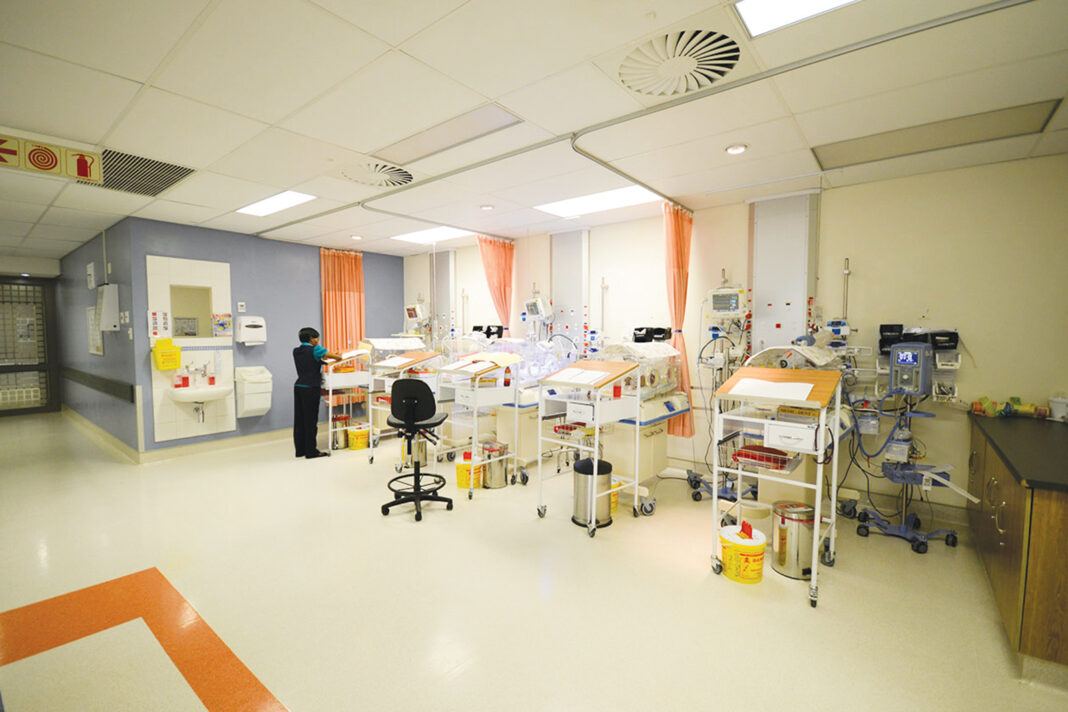By ‘MajirataLatela and Kefiloe Kajane
Government’s announcement of its intention to sever all ties with Tšepong (Pty) Ltd which manages Queen ‘Mamohato Memorial Hospital (QMMH), stakeholders have welcomed the move as a long overdue one which will go a long way to saving taxpayers’ money and restoring Basotho’s faith in the country’s health system.
QMMH is a public-private partnership is managed by the Tshepong Consortium, led by Netcare, a leading South African health care provider. The facility and the associated filter clinics at Qoaling, Mabote, and Likotsi were part of the government of Lesotho’s strategic push to improve maternal health, reduce child mortality and combat HIV/AIDS.
It was officially inaugurated in 2011 amid hope of bringing modern, high-quality healthcare services to about half a million people—or a quarter of Lesotho’s population—living in Maseru district, and also serving the country as a revamped national referral and teaching hospital.
The World Bank Group provided technical assistance for designing and implementing the facility as a public-private partnership that is aligned with reforms in Lesotho’s health sector to increase access to primary healthcare services and referral care. A grant of $6.25 million was provided through the World Bank-administered Global Partnership for Output-Based Aid to support the process.
The 425-bed hospital was touted to provide several new services, including intensive care, that were not provided at Maseru’s old Queen Elizabeth II hospital.
The hospital has constantly been criticized for not investing enough in Lesotho’s healthcare while financially benefitting more than it deserves.
The signs have always been there when it came under fire at the onset of the Covid-19 pandemic last year. In one of many questionable decisions, Netcare’s St Augustine hospital in Kwa Zulu-Natal was in April shut down by government after 47 people working at the hospital had contracted the coronavirus and four people died. This despite the private hospital group having announced a week earlier that it had spent R150 million in efforts to enhance its readiness to treat Covid-19 patients.
Netcare had claimed to have implemented a number of measures to deal with the outbreak. These included training its employees, screening and isolating patients to contain the spread of the virus; it claimed to have spent R150 million to prepare its ICU or high care facilities by ‘purchasing additional ventilators, ultraviolet light disinfection robots and specialised air filters to ensure appropriate disinfection measures’.
Netcare – which receives a unitary payment of M52-million every month from the government of Lesotho – was as a result accused by senior ministry of health officers of not investing as significantly towards strengthening Tṧepong’s capacity to handle the Covid-19 outbreak.
The final straw that broke the camel’s back was its dismissal last week of over 300 nurses, who had gone on strike demanding improved salaries. This move received widespread condemnation in Lesotho and beyond.
It is therefore not surprising that the chairperson of parliament’s social cluster committee, Moshoeshoe Fako, expressed relief at government’s decision to pull out of the QMMH agreement.
Fako says he has a feeling Tshepong may resist signing off the termination, but vowed his committee will push for government to get out of the deal in three months.
“The agreement itself has never favoured Lesotho; it has been the most callous and draconian agreement ever to the country and the nation at large, and there should be a commission of enquiry to find out why the people who signed the agreement did so without considering the loopholes of the agreement, which put the country at a disadvantage.
“There are so many clauses that were made not to just to milk the country of huge amounts of money, that is why the agreement even mentions the closure of Queen II Hospital. In retrospect, that could have been intended to give QMMH total monopoly in the country,” Fako said.
The Lesotho Nursing Association president Raphael Tlali said nurses could not be more excited and relief that government is terminating its agreement with Tṧepong.
He said, to them, this is a victory as they have been fighting for justice and finally they feel like someone has listened.
He, however, said they would like the government, in the meantime, to absorb the QMMH nurses back into the system even if it means deploying them to the districts hospitals and clinics.
“The nurses at Tšepong are very experienced; they will be good when absorbed into other hospitals in the country because we believe that the process of completing the cutting of ties will be a long one.
“Above all, we still want our money that has been taken from us since 2008. The nurses want that money whether Tšepong goes or not. It is our money,’ Tlali said.
According to LNA, nurses at QMMMH earn M9 000 a per month. The figure is way less than the M13 000 earned by their colleagues in CHAL facilities and other government hospitals.
Announcing government’s decision on Wednesday, the minister of health, Semano Sekatle, said government was particularly unhappy with the fact that QMMH management fired the nurses without first consulting or informing them.
He said following the dismissal of the nurses, the cabinet sub-committee met and resolved that the government must cut ties with the consortium due to the ‘toxic nature’ of the relationship.
“Today the government has instructed the ministry of health and the ministry of finance to cut ties between the government and the Tšepong consortium. We are going to this by following the legal procedures as it is only best to handle the matter lawfully to avoid further challenges.
“When the government entered into the public private partnership agreement with consortium in 2008, the expectation was that this would lead to the revival of the health system in the country. But this has not borne the desired results.
“What we thought was going to benefit our healthcare system has only brought many challenges from day one. Some of these problems have culminated in this dispute of striking nurses.”
He indicated that the two parties had over the years clashed over many issues, including the opening and operation of a private ward for patients.
He also indicated that the private ward was established to admit private patients who would pay more for services. He said Tšepong used it for their own gain as they admitted ordinary patients to make more money.
He further explained that the other bone of contention concerned the demands for salary increments by employees.
He also said the consortium refused to award increments to match those that had been awarded by the government in its other facilities and church-run facilities.
“They said we had to give them more money before they could award any increment and despite that more than half of the ministry of health budget goes to the consortium. This is the issue that has now caused the strike which led to the dismissal of the nurses. The nurses will return to work after the ‘divorce’ between the government and Tšepong,” Sekatle said
He said the issues that they have with Tšepong are currently before an arbitrator.
This comes after last week Tšepong fired the nurses after they embarked on a month long strike over salary increment and Covid-19 allowances.
The Democratic Nursing Organisation of South Africa (DENOSA) released a statement, declaring support for its sister organisation in Lesotho, LNA, in calling for the implementation of a salary structure in Lesotho. DENOSA said this will bring labour peace and a positive environment for many nurses who are aggrieved.
DENOSA also said it feels that the Tšepong Group is also transferring the healthcare problems of Lesotho to South African healthcare system and healthcare workers unnecessarily. It said many patients, including management of the same Tšepong Group, will have to travel to healthcare facilities either in the Free State or KwaZulu-Natal, including the Eastern Cape, over a matter that they could have resolved easily.
“This is because there are no nurses who have done the specialist courses needed to operate the machines and equipment at the tertiary hospital. Once the third wave of the Covid-19 pandemic arrives in Lesotho, it will surely wipe away many patients, especially the elderly and those with comorbidities as they quickly suffer severity of infection and will need high care in the form of ICU and would need oxygen, which can only be provided at the QMMH.
Furthermore, the International Council of Nurses (ICN) also threw its weight behind the fired nurses, indicating that it has been in contact with LNA and is deeply concerned about the ongoing situation at Tṧepong. ICN said the current situation is having a detrimental impact on both the physical and mental health of the nurses if they continue to be treated in that manner, the country risks losing access to healthcare for the people of Lesotho.
“For the health of the people and nurses of Lesotho, ICN urges the Prime Minister and government to do everything they can to resolve the current situation and find a resolution that both respects and recognizes the rights, safety and value of your nursing workforce,” ICN said.
Meanwhile Tṧepong released a statement also indicating that the management has held parallel discussions with the ministry of health and presented alternative proposals in an attempt to expedite the resolution.
They explained that on February 17, a meeting was held between the minister Sekatle and the Tšepong board of directors. Later, on the same day, Sekatle confirmed that the matter can only be resolved through arbitration and informed Tšepong that negotiations have been terminated.
According to Tšepong, they subsequently held a special board meeting on February 22, attended by Afrinnai Health (Pty) Ltd, D10 Investments (Pty) Ltd, Women Investment Company (Pty) Ltd, Excel Health Services (Pty) Ltd and Netcare Hospital Group (Pty) Ltd. These are the companies that make up the consortium. Netcare owns 40 percent, while the other own between 10 and 20 percent each.
“After deliberation and consideration of the facts it was unanimously decided that Tšepong had no alternative options but to maintain the terms of employment and continue with the arbitration process.
“All efforts were made to ensure continuity of services by enlisting external nursing staff and reassigning nurses and managers. Non-critical services such as outpatient services continued without much disruption during this time. In-patient services also continued,” they said.









